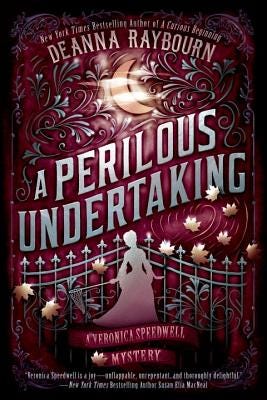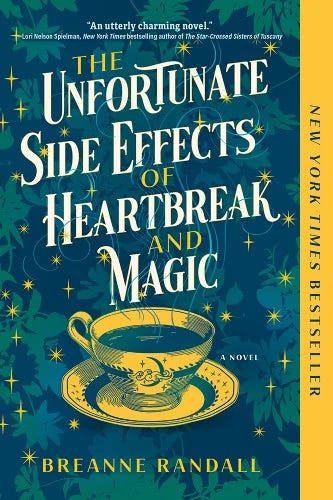On this day in 1536, Anne Boleyn was executed in the Tower of London after being the Queen of England for only one thousand days.1 If you made me choose “My Roman Empire,” Anne Boleyn and the Tudors would be at the top of the list (I don’t know how people have one answer to this question). Historians did her dirty, boiling her down to an adulterous flirt instead of a worldly, educated, and savvy young woman thrown to the wolves of court life. If you want to learn more about Anne and Tudor life, please check out The Anne Boleyn Files and Tudor Society, where author Claire Ridgway talks all things Anne Boleyn and the Tudors. This past week has been all about Anne to commemorate Anne's too short life.
In other news, I learned about Nancy Pearl’s Rule of 50 this week from a recent Booktender post. TL:DR - If you reach the 50-page mark and don’t like what you’re reading, put it down and find something else. After some recent reads, I think it’s time to adopt this rule.
Do you have a similar rule for DNF-ing a book? Or do you tend to suffer your way through because you’re a completionist?
I’m a BookShop.org affiliate! Full disclosure: I will receive a small commission should you order books using my link.
Book Things:
Currently Reading:
Zombies, Pirates, Murder - I’m trying to turn my reading around.
A Perilous Undertaking by Deanna Raybourn: I needed a little fun, so I started book two in the Veronica Speedwell Mysteries. A famous artist has been murdered, and her lover (and the father of her unborn baby) is arrested for the crime. Veronica and Stoker must find out the truth before it’s too late! This series is quick-witted, fast-paced, and jolly good fun. When Veronica and Stoker stumble upon a caché of dildos from the Hellfire Club, I snorted with laughter. (44%)
The Secret History by Donna Tartt: I started filming a new reading vlog this week. It will take a while to film as I am rereading all three Donna Tartt novels, hoping it will manifest her long-awaited fourth novel. I will save most of my thoughts for that video, but of course, I’ll give you all little tidbits as I work through these bricks.
It’s been a couple of years since I read The Secret History, and I’ve forgotten many details. I’m enjoying the writing and how Tartt effortlessly and realistically describes place and our characters. She makes it so easy to sink into the world. I love how ominous it is from the start. We know there will be a murder by the end, but we don’t know how it will all unfold. I don’t remember finding Henry Winter kind of sexy, but maybe I’m just biased because he adopts a greyhound. (18%)
Mad Ship by Robin Hobb: What do I even say? I’m still loving this series. Our characters are growing and changing in all the best ways. Wintrow is becoming very impressive. Kennit isn’t whining about his leg constantly. And Althea has returned home and is ready to take on her vile brother-in-law.
I need to know more about Malta’s sexy(?) Rain Wild man, Reyn Khuprus. My friends tell me Malta will grow on me, but right now, she’s still giving too much Lydia Bennet for my liking. Perhaps she’ll start to grow up as the book continues, and I’ll learn to like her more.2 (40%)
American Rapture by CJ Leede (Out October 15, 2024, from Tor Nightfire): CJ Leede is quickly becoming one of my favorite horror writers. The religious trauma, the violence, the gore - I'm in love with this book. I need to know what happens with Sophie. Will she ever find her brother? Will she get infected? Will Maro remain a friend or succumb to the virus tearing across the U.S.? Whatever happened to Ben? We meet him at the beginning of the book, and then the virus takes root in this small Wisconsin town, and he’s been all but forgotten.
Annoyingly, I was asked to hit pause on this so a friend could catch up and read with me. I’ve given them the weekend, and then I’ll move on without them. The anticipation is too much for me! (46%)
Lies and Sorcery by Elsa Morante: Technically, I read a few pages, but you can barely tell. I’m impressed that I’ve reached the halfway mark. And I’m really enjoying this part. I’m into Part 4, which follows Francesco’s childhood and connection with Nicola. I find this chunk more engaging than the parts that came before it. Maybe I’m finally getting into this book. But if we’re all going to be honest around here, I shouldn’t get my hopes up because I’m sure I'll get distracted by other books and forget about this one for a while.3 (50%)
Recently Finished:
We have our first DNF, and I seriously need book recommendations that will not disappoint. Please leave some in the comments.
Icebreaker by Hannah Grace: No, this wasn’t the DNF, but it really should have been. This is everything I hate in one romance novel, which is a massive disappointment because I love hockey romances.
One, our main characters are too young. At forty, I can no longer read about twenty-somethings falling in love, especially those still in college. I want more romances with 35+-year-old characters, maybe post-divorce, maybe the lady has some cellulite, and perhaps both love interests have careers!
Two, I find it very hard to believe a 22-year-old man is a sex god. I’m sorry, sugar, but some things get better with age (and practice).
Three, and this one is a spoiler: I HATE PREGNANCY TROPES!!! Our FMC (whose name I’m willfully forgetting) works her whole life to get a place on the Olympic figure skating team, only to end up knocked up by her boyfriend, who’s now a professional hockey player - AND SHE’S NOT EVEN A LITTLE MAD! Ma’am, why are you so okay with having your dreams put to the side???? This is the Olympics! You can be happy you’re having a baby and annoyed about the timing. Give me something. It’s so unrealistic to be that giddy about EVERYTHING!
How has this book sold over a million copies????
A Good Bad Boy: Luke Perry and How a Generation Grew Up by Margaret Wappler: I grew up watching 90210 with my brother. It was one of the few times we didn’t bicker. A four-year age difference is huge when you’re a kid, and I wanted to be deemed cool enough to hang out with my older brother, but he mostly found me annoying. Our parents must have enjoyed our weekly bonding ritual because they’d order us sesame chicken from the local Chinese restaurant, and we’d sit in front of the TV and have dinner together.
Of course, Luke Perry was one of my first TV crushes (other notable crushes included Johnny Depp in 21 Jump Street and Leonardo DiCaprio in Growing Pains). He was mysterious, read Byron, had a motorcycle, smoked cigarettes, and generally oozed cool à la James Dean. When I found out Luke Perry passed suddenly at such a young age, my heart broke a little. He was such a wonderful man on and off screen. I loved reading about his career and his life off-camera. I never knew he had a pet pig while filming 90210
Sinking into the nostalgia of 90201 and some of my favorite characters growing up was fun. Unfortunately, the author decided to alternate between her life story growing up watching 90210 and Luke Perry’s. I understand she did this to share a piece of herself while sharing pieces of a notoriously private man’s life. It’s a nice gesture but did nothing for me as the reader. I would have preferred more about Perry and less about the author, making this a fairly mediocre celebrity memoir.
The Unfortunate Side Effects of Heartbreak and Magic by Breanne Randall: Life is too short for me to suffer through this book. The romance was meh, the magic wasn’t interesting, and our main character was annoying. The best part is the recipes, but that’s not a good reason to finish it. Off to the Pango shelf, it goes!
Just in from publishers:
Lucky Dogs by Helen Schulman (Out in paperback May 21, 2024, from Vintage): Two women meet in line at an ice cream kiosk late at night in Paris. A man harasses them, and one of them pulls out a knife. From this encounter, a friendship is born. “Helen Schulman lays bare what happens to women--no matter how fortunate they may appear to be on the surface--whose lives have been warped by brutality and misogyny.” I’m expecting a dark, emotional, fast-paced thriller adjacent novel exploring love, betrayal, and survival. If you’ve read this, please let me know your thoughts in the comments.
3, 2, 1, Round-up:
(AKA Random Non-Bookish Things Because I Totally Have Other Interests)
Three Random Things I’m Loving:
I bought myself a Hello Clio Kindle Belt Bag in Iced Coffee. I’ve been eyeing these for a bit and finally pulled the trigger. Do I really need a bag with a Kindle pocket? Probably not. Will it encourage me to leave the house more? Maybe? It’s so stinking cute! I had to have it!
I’ve returned to my knitter roots, at least for this week. I used to be an avid knitter, knitting a sweater in a matter of weeks. This was until I developed cubital tunnel syndrome, and my right arm couldn’t handle all that stick work. I’ve gotten the itch to knit many times since then and will occasionally crank out a small project or two a year, but it’s been a long time since I’ve finished a whole sweater, until now! I finally completed all the pieces for a simple pullover I’ve worked on for three years, but I still need to sew it all together. Which means I started a new sweater to avoid all that sewing. I will share photos of the final sweaters when they’re ready.
I finally watched The Quiet Girl, a dramatization of Claire Keegan’s Foster.4 It’s beautifully filmed and captures Keegan’s story perfectly. Please find a way to watch this, and make sure you have some tissues nearby because you will cry. My heart broke for Cáit. I couldn’t imagine being shipped off to an unknown relative’s home for the summer while you’re mother gives birth to yet another sibling. What a terrifying prospect! Luckily for Cáit, she finds love and safety in this strange new place, and she blossoms. The Quiet Girl “shows that home is where you feel loved.”
Two Videos to Watch:
Did anyone watch Argyle?5 Did you know it is based on a book? The backstory behind this flop of a movie is fascinating. Oh yeah, and Swifties are terrifying.
CC Saurez is one of my favorite channels focused on scammers and MLM huns, but this video discusses something we see with many creators—Trova Trips. I’ve always found these trips extremely expensive but also mildly terrifying. What if you’re stuck in Italy with your stalker? (Great book idea, by the way). And imagine having to be your polished internet self for the whole trip? Do you get alone time? What if your roommate is a complete weirdo? This is the first time I’ve seen an influencer questioning Trova Trips and admitting how creepy it all sounds.
One Adorable Picture of Mercy:
SITREP is a free weekly newsletter that goes out every Sunday about books and things. If you want to support my work, consider becoming a free or paid subscriber. You can also simply like and share this post with your friends.
Thank you for reading. See you next week!
Thank you Tom!
I’m currently wrapping up the newsletter after working three in a row, and my plans for the day are to sleep and binge more Mad Ship in my PJs.
Again.
Again, thank you Tom!!
Seriously, has anyone seen this movie??















It was four years ago today, September 14, 2020, that director Colm Bairéad began filming “An Cailín Ciúin”—“The Quiet Girl”—based on Claire Keegan’s long short story “Foster”. It was a planned five-week shooting schedule at locations in and around County Meath, Ireland.
Some Thoughts on "The Quiet Girl" (Contains Spoilers)
Concerning Cait's Home Situation -- Many film critics have described Cáit as being a neglected, or even an abused child. One reviewer on the Collider entertainment website went so far as to suggest that Cáit’s father Dan has sexually molested her (See the Collider for February 24, 2023 “’The Quiet Girl’ Ending Explained: Cáit Finally Finds a Family” by Adam Grinwald).
The evidence Grinwald cites is Cáit’s bedwetting problem. He also thinks it’s suspicious that when Eibhlín asks Cáit to come with her to the well for the first time, Cáit asks if going to the well is a secret. “Am I not supposed to tell?” she says. Grinwald sees child abuse as “a crucial plot point” in the film. He states that Cáit is so withdrawn because she bears a burden of “undeniable shame” due to the “cruelty and abuse” inflicted upon her by her father.
This is a painful subject to tackle. Whether she’s the scruffy little girl who lives in Claire Keegan’s “Foster”, or Cáit as portrayed so endearingly in the film by Catherine Clinch, we feel so protective of her as a child that we rebel against the very idea of her being harmed in any way, even though she’s a fictional character.
In my opinion, there is little to no evidence in the film to support the idea that Cáit is being abused by her father. Cáit’s bedwetting is far more likely the result of her being stressed out by the tension and verbal conflict between her parents at home.
As for Cáit’s question if going to the well is to be kept a secret, Eibhlín’s initial reaction in the scene suggests she knows exactly what sort of ugly secrets little girls might be asked to keep by certain adults. But then she veers off into chiding Cáit about not having any secrets or shame in her house, as if the possibility of child sexual abuse never even occurred to her.
Looking at the source material, Claire Keegan has her little girl think to herself after Mrs. Kinsella asks her to go to the well: “Something about the way she says this makes me wonder if it is something we are not supposed to do.” This remark doesn’t come anywhere near suggesting a history of sexual abuse in the girl’s background, although on the other hand, Keegan also has her little heroine say when she sees the Kinsellas’ bedroom: “This, I know, is where they sleep, and I’m glad, for some reason, that they sleep together.” Nevertheless, neither in seeing the film nor in reading the story, does one come away at the end with any fears or misgivings that Cáit is the victim of sexual abuse on the part of her father.
The evidence actually points the other way. When Dan is driving Cáit home from school, he stops to pick up a young woman walking by the side of the road. From their conversation, it is evident that Dan and the young woman are in a relationship. Besides revealing that Dan is cheating on his wife, Mary, the scene also leads us to conclude that Dan is only interested in women his own age.
Later on, Mary and Dan are shown discussing how long Cáit should stay at the Kinsellas. Dan speaks as if he doesn’t care how long his daughter is away: “Can’t they keep her as long as they like?” he asks. If Dan were really abusing Cáit, wouldn’t he want her available to him at home? And wouldn’t he worry that she might disclose her abuse to Eibhlín and Seán? And how do you explain why Cáit takes so readily to Seán after she arrives at the Kinsellas? If her father were abusing her, wouldn’t she be fearful of other men, especially strangers?
As for any other physical mistreatment, in the scene in question where secrets and shame are being discussed, Eibhlín has just given Cáit a bath and apparently hasn’t observed any suspicious bruises or other injuries on her body.
As I see it, Cáit and her siblings are not the targets of any deliberate, willful acts of violence or threatening behaviour from either of their parents. Neither do I view Dan or Mary as intentionally neglecting their children’s physical care. Cáit’s comments to Eibhlín about her mother wanting her to change her underwear every day and not allowing her to drink anything before bedtime clearly show that Mary is taking what reasonable measures she can to manage her daughter’s enuresis. In the opening scene, we see that Cáit’s bed appears adequate, complete with a box spring and mattress that appear in good condition; she’s not sleeping on a stained, raggedy, bare mattress on the floor as I sometimes saw children do during my child protection days.
Mary does the best she can with the means at her disposal to provide her children with a basic level of physical care. Unfortunately, she seems less aware of their mental and emotional needs. She sometimes fails to foresee the full consequences of her actions, with the result that she comes across as insensitive and uncaring. For example, when Cáit wets her bed at the beginning of the film, her mother is prompt to launder her sheets and nightgown. But in doing so, she doesn’t have time to make her daughters’ lunches, and so the older girls have one more reason to resent their little sister. They are quick to complain to their Da that their Mam’s attention to Cáit’s needs that morning means they have no lunches for school. Dan, who has only just got up out of bed after leaving his heavily pregnant wife to do all the work of getting the girls up for school as well as Cáit’s laundry, can only suggest to his daughters the half-assed solution of making do with a piece of bread. The situation might have been avoided altogether if Mary had only thought to wait until after the girls had left for school to do Cáit’s laundry.
This opening sequence highlights the real risk factors the children face in their home, the fact that their parents are not working together as a team to create a safe, secure home life for their children or themselves. Dan is feckless and irresponsible as a husband and a father. He’s also lazy and ineffective as a provider for his family. It’s Mary who does all the heavy-lifting in the home as far as caring for the children and even running the farm. She’s the one who has to arrange for someone to come and take in their crop of hay.
Dan also wastes money gambling and drinking, which only increases the level of tension between him and Mary, and so contributes to the children’s mental and emotional stress. This stress probably has a greater adverse effect upon Cáit, as she seems to be a sensitive and reserved child to begin with. And it’s this stress and lack of a sense of security, not physical or sexual abuse, that I think is the cause of her bedwetting.
I also don’t believe there is any domestic violence in the home. Whatever her faults, I don’t think Mary would tolerate such behaviour from Dan, nor would she allow him to abuse their children. The nighttime scene where Mary asks Dan how long Cáit should stay with the Kinsellas and he baulks at giving a definite answer and gets up and leaves the house, angrily slamming the door behind him, is probably typical of their arguments. When faced with a fight or flight situation, I think Dan chooses flight every time. In fact, the film suggests Dan spends a good deal of time away from home pretending he’s still single.
The idea of Cáit being physically or sexually abused by her father is also drastically discordant and cross-grained with the overall tone and mood of “The Quiet Girl”. It’s enough for Cáit to suffer from inadequate parental love and attention at home; the success of the film’s plot doesn’t require her to be abused as well.
A victimized Cáit would also clash with the artistic integrity of the film. After observing the sorry life she endures at her grim, dismal bunker of a home, we feel grateful towards Eibhlín and Seán when we see how warmly they welcome Cáit into their lives and give her the care and attention she’s been deprived of in her own family. The idea that the kind and gentle Kinsellas would then drive the innocent, young Cáit back home at the end of the summer, only to have her—unbeknownst to them—fall prey to her predatory father again would be an unthinkably horrific conclusion to the film. It would send the movie plunging right off a cliff down to a whole new darker level that would leave the audience stunned and aghast. And the fact is, that is simply not the emotional response we feel when we watch the final scene of “The Quiet Girl”. The ending of the film is sad and bittersweet, not tragic and despairing.